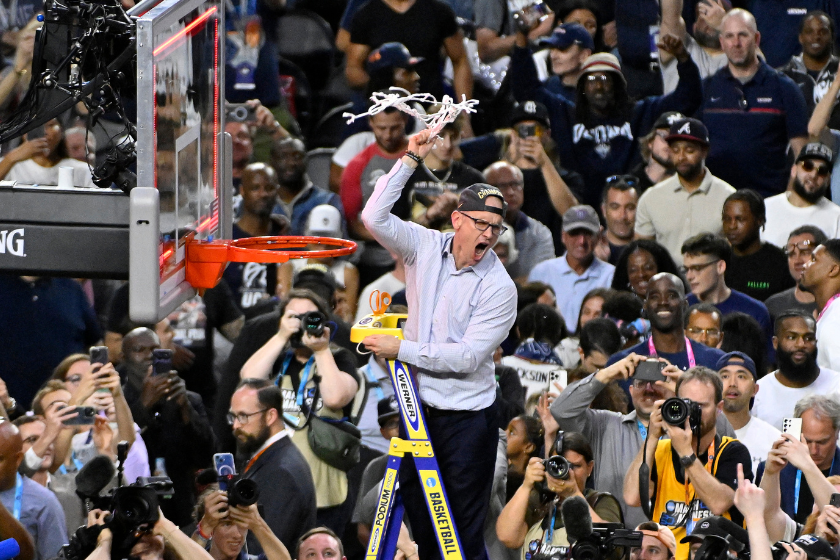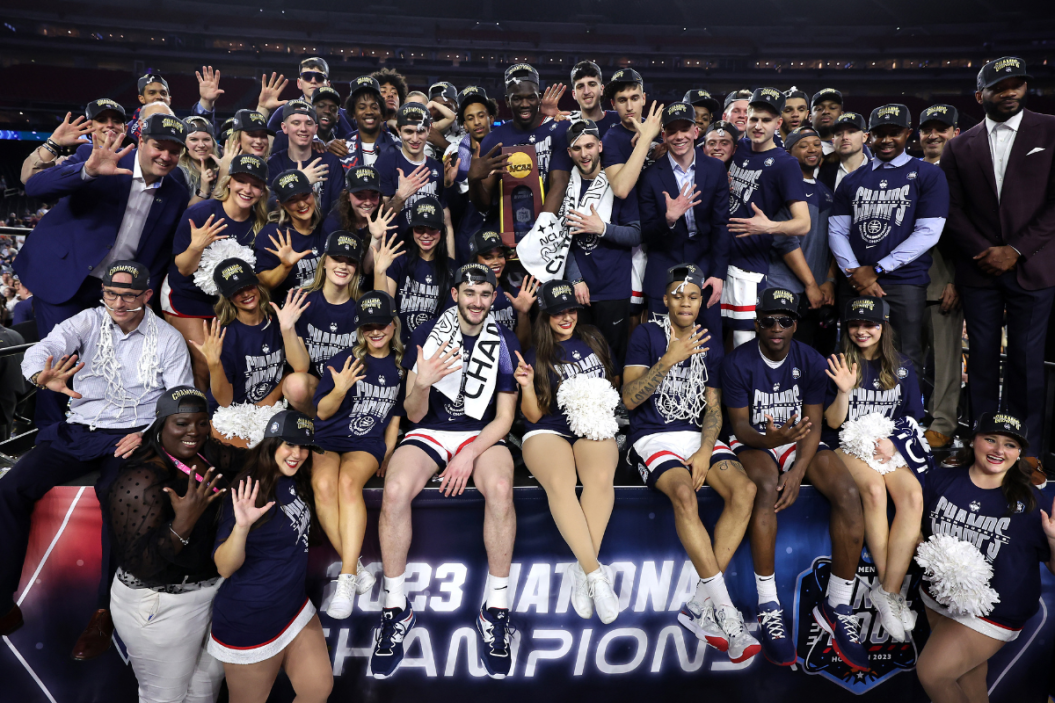The Connecticut Huskies are national champions once again. In a season when pundits kept saying over and over again that no teams stood out as being heads and shoulders above anyone else, Dan Hurley's squad proved that, actually, it was the best team in the country. With their 76-59 victory over San Diego State in Monday night's championship game, the Huskies became just the fifth team in NCAA history to win each game in the tournament by double digits.
Videos by FanBuzz
Adama Sanogo once again dominated the inside for the Huskies. The big man had 17 points and 10 rebounds, and was a constant disruptive force on defense. Tristen Newton had 19 points and 10 rebounds, while Jordan Hawkins was the only other Connecticut player in double figures with 16 points.
The Aztecs tried to muck the game up and slow things down, but UConn was able to do just enough to keep the game out of reach for much of the night. When the last spurt for SDSU cut the game to 5 with a few minutes remaining, Hawkins came right down to bury a three, ending the Aztecs' rally and effectively crushing their hopes for a comeback.
The Newest Blue Blood

Photo by Logan Riely/Getty Images
RELATED: Danny Hurley's Coaching Career: From New Jersey Royalty to UConn's Final Four Berth
This is UConn's fifth national championship. All five of those titles have come since 1999. That ties them with Duke and Indiana for the fourth-most men's national championships in NCAA history.
The debate over which programs are blue bloods is a little bit like most GOAT debates: There's no one correct answer, but there are definitely wrong ones. UCLA's run of dominance under John Wooden will likely never be challenged in the modern era of college basketball; and even though the Bruins have now gone 28 years without a championship, they'll forever be grandfathered into blue blood status. Kentucky and the University of North Carolina may have a few down years now and then, but their blood is undoubtedly blue. Indiana wears red — can they really be considered a blue blood?
UConn has never really been considered a blue blood. They're the "new money" crowd of college basketball, showing up to a Cape Cod vacation in a drop-top Rolls Royce, just letting you know how good they are. But you know which school now has one more national championship than the hallowed, blue-blooded Kansas Jayhawks? The Connecticut Huskies.
Their uniforms are blue. Their blood is, too.
Big East - Best Conference in College Basketball
.@UConnMBB 's 5 titles since 1999 would be more than every other CONFERENCE over that span EXCEPT the ACC & Big East
NCAA titles since 1999:
ACC / Big East - 8
UConn - 5
SEC - 3
Big 12 - 3
Big Ten - 1
American - 1
Pac-12 -0 pic.twitter.com/yPcvVDUwtF— Adam Zagoria (@AdamZagoria) April 4, 2023
More important than the blue blood conversation, though, is the debate over which conference is the best in college basketball.
Numbers don't lie. The Big East has eight national titles since 1999. That does not include UConn's 2014 championship, because that was when it was in the American Athletic Conference after ditching the Big East for football. It does include Rick Pitino's Louisville 2013 title, which was technically vacated due to scandal, because, yeah, scandals are not great, but also — the games were played and the Cardinals won!
This season, Connecticut was not ranked in the preseason AP Top 25. Then it went 14-0 to start the season, including wins over Alabama, Iowa State and Oklahoma State. It became a trendy pick to go deep in March and was even ranked No. 1 in the nation.
What happened next? Big East play started and the Huskies stumbled.
Now, the popular narrative in the wake of UConn's dominant run through the tournament is that the team just had a rough patch, coach Hurley was yelling too much, it eventually had a players-only meeting and everything got sorted out. And, sure, there's probably some truth to that.
You know what else is true? The Big East is a stacked conference. Connecticut lost to Xavier, Marquette, Providence and Creighton — all schools that qualified for the NCAA Tournament. If not for a controversial foul call late in its game against SDSU, Creighton may have even joined UConn in the Final Four.
But it's not just the upper tier of talented teams that makes the Big East a gauntlet. UConn lost to Seton Hall and St. John's in the regular season, two teams that were not even on the bubble of the bubble at the end of the season. It squeaked by a truly terrible Georgetown team by just 6 points. On any given night, any Big East team is capable of pulling off a huge upset. It's a conference full of talented players, tough gyms and rabid fans.
Lots of people wrote the Big East off when conference realignment shook things up in 2013. But while losing Syracuse and UConn (for a few years) hurt, the teams that stayed behind built a very strong conference full of programs and fans caring deeply about their basketball. They brought in Butler, Creighton and Xavier — solid basketball schools.
Connecticut basketball was lost in the wilderness just a few years ago. Following the somewhat fluky run to the title in 2014, it became clear that head coach Kevin Ollie was not fully up to the task of running the program. Instead of playing at Madison Square Garden in the Big East Tournament, the Huskies were toiling away against the likes of Tulsa and SMU in the AAC — and losing.
But in 2020, the Big East extended an olive branch to its old friends, welcoming the Huskies back into the fold.
Now the Huskies are national champions again. They finish the season with a 31-8 record.
How many of those eight losses came in non-conference play? Zero.
That's right. The only teams that could beat the national champions played in the best conference in basketball: the Big East.
